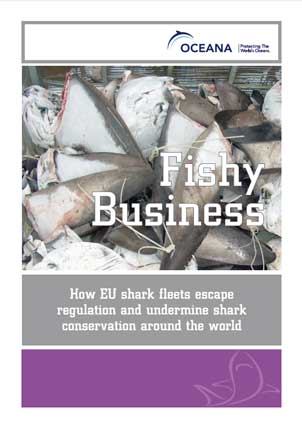Report | April, 2010
Fishy business: How EU shark fleets escape regulation and undermine shark conservation around the world
In 2006 and 2007, Oceana researchers carried out a year-long investigation into European Union shark fisheries and trade of shark products (meat and liver oil fins) around the world. These investigations are part of a major campaign to conserve sharks, threatened animals that are crucial to maintaining the health and stability of ocean ecosystems. As top predators, sharks prey on the sick and weak, ensuring that stronger and healthier individuals survive, and keeping the population sizes of their prey species in check.
Oceana researchers visited harbours in Europe, Africa and South America, talked to fishermen, scientists, processors and trade companies and collected further information, data and photographic material from other institutions, such as the photographs revealing the trade of shark fins by the Spanish longliner fleet in Papeete, French Polynesia although this is forbidden there. This report reveals the IUU fishing activities of two Spanish shark fishing vessels in international waters of the Western and Central Pacific Ocean. Oceana’s worldwide investigations also shows that fisheries and trade by the EU’s shark longliner fleet is causing various problems in countries with vulnerable ecosystems and established laws to protect sharks.
Sharks are exceptionally vulnerable to fisheries overexploitation and slow to recover from depletion. Blue sharks, mako sharks, hammerhead sharks and thresher sharks are the species most targeted by EU longliner fleets. Almost all shark species targeted by those vessels are considered threatened with extinction according to World Conservation Union (IUCN) Red List criteria.
Because fish stocks in European waters are widely overfished and European fish consumption is still growing, EU vessels today travel further and further to find new fishing grounds. These vessels are fishing under various legal frameworks, but not all are covered by the European Union’s Common Fisheries Policy. But even when vessels are operating under EU law, with few exceptions, shark fisheries are not restricted.
In 2005, a worldwide catch of 771,000 tons was reported for elasmobranches (the group of sharks, rays and skates) to the Food and Agricultural Organization of the United Nations (FAO). With catches approaching 100,000 tons, the European Union is the second elasmobranch- catching state in the world, behind Indonesia and ahead of India.
About 40 per cent of these sharks and rays were caught in distant waters by the EU. Vessels from Spain, France, Portugal, the United Kingdom, Lithuania and Estonia fished sharks in the South Atlantic Ocean, Indian Ocean, Pacific Ocean and even in the Southern Ocean.




